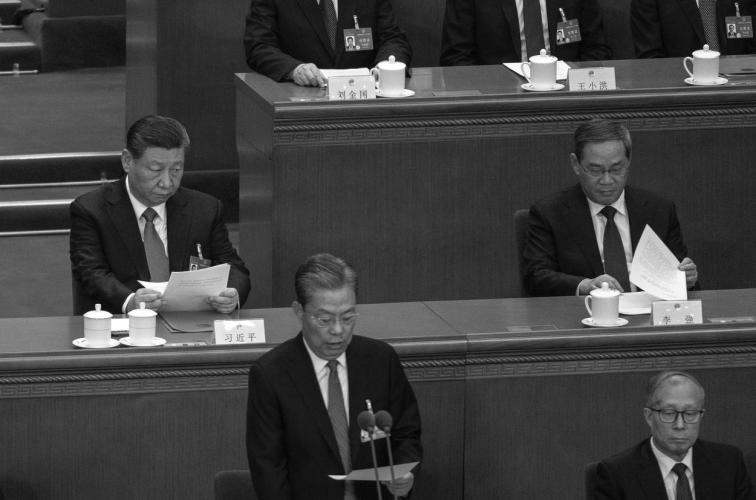On March 5, 2025, PLA delegates arrive at the Great Hall of the People in Beijing to attend the opening of the National People's Congress. (Photo by Kevin Frayer/Getty Images)
[People News] The high-level trade negotiations between the US and China, which commenced on May 10, began in an unusual manner. Just minutes into the opening, the Chinese representatives abruptly stood up and left the venue, creating a tense atmosphere that nearly suggested the talks had collapsed.
However, shortly thereafter, the Chinese delegation quietly returned to the negotiating table, continuing discussions from Saturday afternoon through the entirety of Sunday.
Around 10:30 PM Swiss time on Sunday, He Lifeng, Vice Premier of the State Council of the Communist Party of China, announced that the negotiations had achieved results. Less than 12 hours later, at 9 AM on Monday, May 12, both the US and China simultaneously issued a joint statement regarding the Geneva economic and trade talks, using official language that indicated 'substantial progress' and 'mechanism restart.'
This gave the impression to the outside world that the negotiations were 'unusually smooth.' However, the key to this 'unusually smooth' outcome did not stem from the negotiating table in Geneva, but rather was the result of high-level political maneuvering in Zhongnanhai, Beijing.
Just before and after the announcement of the negotiation results, Xi Jinping did not make any public appearances for a full 72 hours from Saturday to Monday. At this critical juncture in the negotiations, the hardline command centre of the Communist Party, which had maintained a tough stance since the onset of the US-China tariff war, appeared to have temporarily shut down.'
On Saturday noon, Swiss time, Xi Jinping's special plane was still returning to Beijing from Moscow when the Chinese delegation, led by He Lifeng, suddenly interrupted the negotiations and briefly exited. He returned to the hotel to urgently consult with Beijing, as the US side had just presented three highly political negotiation conditions:
First, the release of Hong Kong's Jimmy Lai;
Second, no military action against Taiwan;
Third, there is a need for thorough cooperation in the fentanyl crackdown.
These three conditions are not merely economic issues; they directly challenge the most sensitive political taboos of the Chinese Communist Party.
At this moment, Beijing has entered a state of emergency. According to insider reports, on Saturday night Beijing time, as soon as Xi Jinping's special aircraft landed, it was taken under control by Zhang Youxia, Vice Chairman of the Central Military Commission. He was then immediately sent to Xishan Hospital, effectively withdrawing from the command structure.
The entire command of the Geneva negotiations was also temporarily assumed at this juncture. That afternoon, Swiss time, after the elder statesmen received a briefing from Li Qiang regarding the negotiation status, the Standing Committee made an urgent decision: He Lifeng would continue to represent the Chinese side in the negotiations, but he must fully adhere to the central temporary negotiation guidelines—Trump's three demands were generally accepted, but it was essential to maintain face, control the pace, and ensure proper presentation:
First, do not oppose the release of Jimmy Lai (Li Zhiying), but request coordination through medical parole and retrial.
Second, concerning the Taiwan issue, the CCP will no longer actively provoke friction, but will ask the U.S. to limit the pace of Taiwan independence.
Third, regarding the fentanyl issue, the CCP is willing to cooperate in the crackdown, but must avoid labelling the source country.
This entire set of compromise strategies was rapidly formulated only after Xi Jinping lost contact and the elder statesmen made a temporary decision, allowing He Lifeng to return to the venue to present it to the U.S. side.
On Saturday afternoon, May 10, Swiss time, negotiations between China and the U.S. commenced and lasted for several hours. The discussions continued the following day, ultimately reaching an agreement on Sunday night.
The next day, Monday, at 9:00 AM Swiss time, China and the United States officially issued a joint statement simultaneously. While everything appeared to be going smoothly on the surface, in reality, Beijing was undergoing a temporary transition, rapidly addressing urgent issues and making emergency arrangements. This situation resembled an emergency takeover of power following a central power outage.
Source: Jiang Feng Time











News magazine bootstrap themes!
I like this themes, fast loading and look profesional
Thank you Carlos!
You're welcome!
Please support me with give positive rating!
Yes Sure!